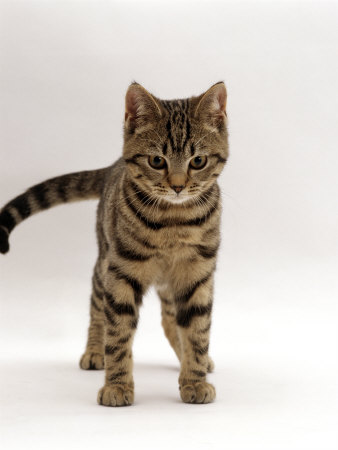Feral Cats 4: Wooper, the Odd Duck, er, Cat
This is a series of Caturday posts on the topic of taking in feral cats.
General information (from pervious posts):
For a few decades, we have rescued feral cats. In fact, with only one exception, our "domestic" cats have been ferals that we brought inside to join other ferals, already domesticated, as part of a bonded cat family. Right now, we have five cats (alas, Murjan, the single non-feral cat we had, died from cancer last fall), all of whom get along pretty fabulously.
Of course, all of that is easier said than done, and the bonding took time -- lots of it. Here are some of the things we did to create our cat family, some of which is not at all typical of what others have done, but it has worked for us.
- We don't trap the feral cats at all; we win them over and invite them in. We do this by feeding them a distance from the house and walking away, then moving the dish closer and closer to the house and walking less and less far away, until they are eating at our feet, at which point they will usually let us scooch or kneel beside them. To get to this point may take weeks. Getting to pet them takes additional days. And, then, like magic, they are almost always willing to come into the house if we leave the food inside the door.
- We have never trapped a cat with a cage, though we do have to put the cats into a carrier (some vets are unhappy about not having feral cats in an open cage because they usually want to sedate them rather than risk being bitten -- I always offer to hold them, and, when allowed, the biting does not happen).
- Post vet visit, things can get interesting, especially if there are other cats; we are always careful in introducing a new feral cat into the family (that topic belongs in another post -- and we will get to that in the future).
- Feral cats tend to be shy; they do not immediately become lap cats, but, with patience, most do become attached, seek petting, and often do became lap cats. The trick is not to force the relationship too quickly and to realize that each cat is different.
In this post, I introduce a new example of another feral cat rescue: Wooper.
Wooper came to us via our vet. His neighbor had found her in the grass, and he was looking for a home for her. She was young, so she was not completely feral like most of our other cats. But she has always been shy -- until lately. (It takes a while for street cats to adjust to homes.)
Because Murjan, our alpha cat was wearing a cone of shame and healing from surgery at the time that Wooper arrived, his pal and protege, Intrepid, took on the socialization task. Wooper imprinted on him, completely. Intrepid was a dare devil; Wooper became a dare devil. Intrepid was independent; Wooper became independent. And Wooper followed Intrepid everywhere. She ran away from humans, but she after Intepid. Once when we took both of them to the vet at the same time and Intrepid was put away in the carrier, having finished first, Intrrepid became upset, jumped down from the vet's table, and circled around the carrier, assessing, assessing, and, then the light dawned. She started trying to unscrew, one after another, the bolts that held the carrier top to the carrier bottom. She even had some partial success with one of them. No dummy that cat!
At one point in time, Wooper started losing her hair. It disappeared from her stomach and a goodly portion of both of her sides. The vet had no idea was happening. Then, I noticed that Wooper was licking herself a lot. She was licking off the hair. The vet thought maybe she felt itchy and gave us some cream. That did no good, but it definitely made a mess.
Rather by coincidence we found out that massaging Wooper's sides and back calmed her. Normally, if we touched her, she would sprint away. But if we massaged her, that was a different story. She would want more and more and more and more -- and for the first time ever, she began to purr. With time, she has started to come up to us and tap us on the arm to indicate that she wants to be massaged. She has stopped licking herself -- she comes for a massage instead. And her hair has grown back in.
Wooper is the first cat we have had who cannot meow. Her mouth opens, but no sound comes out. When she has been accidentally trapped in a closet, she has figured out that scratching at the door frantically gets our attention, and we come to her rescue.
Yeah, odd duck, but somehow she fits in with our motley gang of rescued ferals.
Wooper's human is MSI Press author, Dr. Betty Lou Leaver, author of:
Available retail, online stores, and, at 25% discount with code FF25 from msipress.com/shop.
Read more posts and excerpts HERE.
Co-authored with Laura Dabbs, University of Alabama at Birmingham. Available retail, online stores, and, at 25% discount with code FF25 from msipress.com/shop.
Read more posts and excerpts HERE.
For more feral cat stories, click HERE.






Comments
Post a Comment